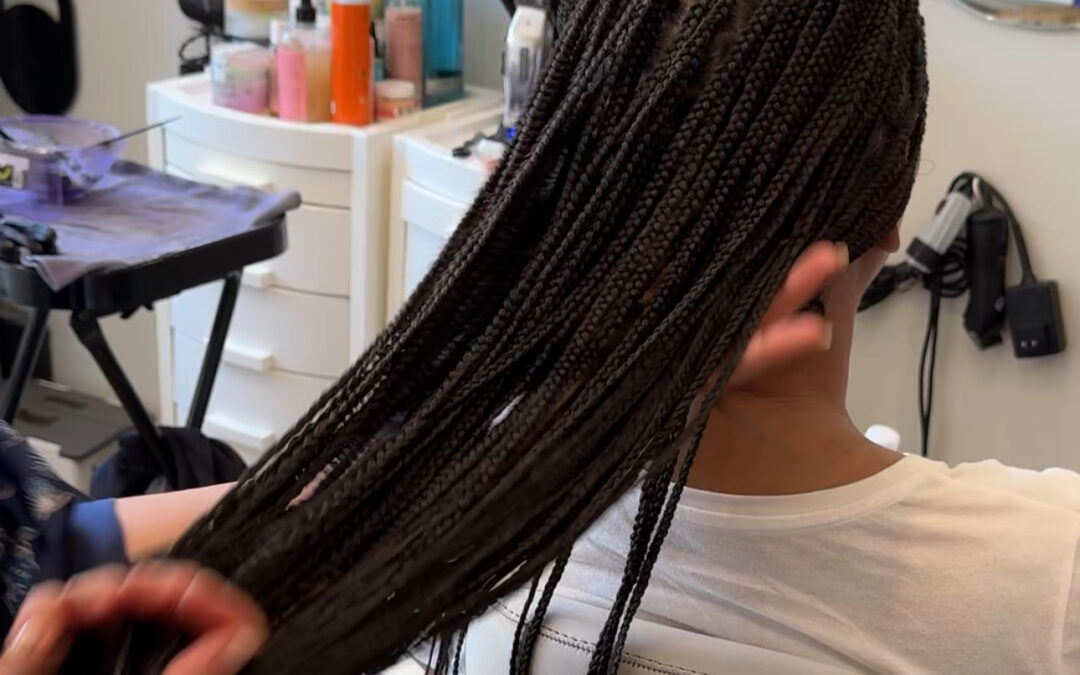Introduction
The recent Consumer Reports study on synthetic hair has delivered unsettling results. Confirming long-held concerns, the study, detailed in Leigh-Ann Jackson’s article, reveals that 100% of the top ten braiding hair brands tested contain harmful VOCs, lead, and carcinogens.
This isn’t just a news flash; it’s a wake-up call. We’ve been here before. The recent natural hair renaissance was driven, in part, by the desire for healthier alternatives after hair relaxers were linked to an increased risk of certain cancers. This new revelation about synthetic braiding hair feels like a betrayal of the hard-won progress we’ve made in embracing our natural hair and cultural styles.
So, where do we go from here?
The Impact on Our Traditions
Consumer Reports’ findings hit hard because our hair customs are deeply intertwined with our identity. We’ve relied on certain products to achieve the styles that connect us to our ancestors and reflect our personal style. The fear is real: how can we continue to honor our traditions when the very tools we use are potentially harming us?
This revelation forces us to confront a difficult truth: the pursuit of flawless styles may have come at a hidden cost. We’ve been conditioned to believe that certain products are essential for achieving our desired looks, but at what expense?
A Call for Radical Honesty and Re-evaluation
Now, I know this might ruffle some feathers, but it’s time for some radical honesty. We need to challenge the status quo and question the very definition of “beautiful” within our community.
Here are some provocative questions that may spark a much-needed dialogue:
1. What if we just let our hair live in its natural frizz? What if we embraced the texture that grows from our scalps, celebrating the unique beauty of our natural hair? Frizz isn’t a flaw.
2. What if we braided down the natural length of our hair? Imagine intricate braids that showcase the natural length and volume of our hair, without extensions or added chemicals. It’s possible.
3. What if we let our Afros shrink? We love the big, bold Afro, but what if we allowed our hair to naturally recoil, embracing its natural volume and shape? What if we valued health over size and length?
4. What if we normalize free-form or cultivated locs for all ages? What if we allowed our locs to evolve organically, celebrating the natural process and release the stigmas that are attached to locked communities?
These questions aren’t about abandoning our traditions; they’re about honoring and reimagining them. They’re about prioritizing our health and well-being without sacrificing our cultural expression.
The Path Forward: Embracing Cleaner Beauty Alternatives
The good news is that we don’t have to choose between our health and our heritage. There’s a growing movement within the Black hair community that’s focused on clean, natural, and non-toxic products.
Here are some braiding hair brands that are leading the way:
- ReBundle: Founded by, Ciara Imani May, is known for their sustainable, plant-based braiding hair derived from naturally extracted banana fiber.
- Dosso Beauty: Founded by Kadidja Dosso, this brand focuses on clinically tested, pre-cleansed, pre-stretched, hypoallergenic and itch-free braiding hair.
- Nourie Hair: Founded by Osahon Ojeaga this brand boasts vegan, clean braiding hair that releases a nourishing complex during the wear of the hair.
100% human hair is another alternative to minimize or avoid harmful toxins and the discomfort that can come from chemical inflammation. It is recommended to still pre-wash the hair prior to installation as an extra precaution.
Here are some Human hair bundle hair and wig brands that are at the top of our list:
- Trace by Angela C. Stevens (aka. Angela C. Styles): Includes classic bundles, clip-ins and U-part inventory options are coming soon.
- True & Pure Texture by Pekela Riley: Includes bundles and clip-ins with an array of textures to achieve endless styles.
- Eve By Boz by Bozoma Saint John: Accompanied by a full care line up, this new line of human hair wigs and bundles offers texture variety and inches that are great for head-turning looks: Eve By Boz Products are manufactured in Ghana, West Africa.
Conclusion
The Consumer Reports study is a turning point. It’s an opportunity for us to redefine our beauty standards and reclaim our hair rituals. Let’s continue to embrace our natural textures, explore innovative styles, and support brands that prioritize our health.
It’s time to strip down to the basic necessities of healthy haircare. Our traditional styles can be achieved with safer products and in some cases, a curated paired down line up. We don’t have to sacrifice our health for beauty. Let’s create a future where our hair is a symbol of both our heritage and our well-being.
Let’s start the conversation. What are your thoughts? Share your experiences and insights in the comments below.
Zenda Walker is licensed cosmetologist and award-winning author of “Zara’s Wash Day” and “Zion’s Crown”- two books that celebrate hairstyles of the African Diaspora (Released by Running Press Kids in 2024). Zenda is also the CEO of Know Your Hairitage-an education consulting company that supports K-12 school districts with culturally responsive programming. She is represented by The Seymour Agency. For more information visit www.knowyourhairitage.com.
